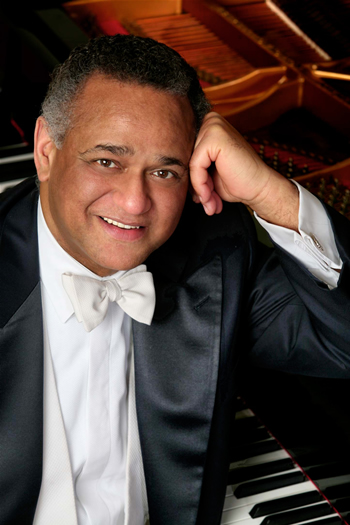Attentive, eager music lovers packed Dana Auditorium on the bucolic campus of Guilford College. The program was top heavy with a war horse played by one of the state’s most beloved piano soloists André Watts, a rare performance of a colorful, full-blown transcription of a chamber music favorite, and the world premiere of a challenging horn concerto. This was a fitting memorial for conductor Sheldon Morgenstern (1938-2007) who founded the Eastern Music Festival 50 seasons ago. The plight of contemporary music and musicians was one of his major concerns.
To honor the Fiftieth Anniversary of the EMF, director Gerard Schwarz commissioned five new works by young American composers for Saturday concerts played by the all-faculty professional Eastern Festival Orchestra. These were planned to be, as is too often the case, short works to serve as concert openers. The first two, Pierre Jalbert’s “Elegy for String Orchestra” and Peter Boyer’s “Festivities,” were tonal imaginative scores that whetted the appetite for more. In recent decades nationally these short commissions too often amount to a shell game in which an orchestra does its bit for contemporary music and the composer half-heartedly dashes something together with both knowing the score will gather dust after the world premiere. The EMF’s second commission is a fortuitous exception to the pattern! At the pre-concert lecture, composer Michael Hersch (1971- ) explained he turned down Schwarz’s initial offer for a short work. Hersch’s older brother, Jamie, is co-principal horn of the Singapore Philharmonic. He had a counter proposal. For years Michael had wanted to compose a substantial horn concerto for his brother. Schwarz readily accepted the offer which is why this concert program, with three major pieces, was so long. The Virginia-born composer has an impressive roster of works ranging from chamber music to three symphonies. He is also a formidable pianist.
Hersch described his work, a sheltered corner, concerto for horn and orchestra, as a “relatively dark piece” in nine short movements in which episodes of turmoil are contrasted with several oases’ of quiet. The movements ranged from a few running 1-2 minutes to longer ones six minutes in length. The composer said he was often inspired by poetry which is why the title of the work is in lower case letters. The orchestration has an extraordinary range in dynamics as well as fascinating pairing of sections with the soloist. Loud, massive dissonances are set against ethereal, often mournful strings or woodwinds. Jamie Hersch was a phenomenal horn soloist with a remarkable dynamic and tonal range. His sound was very even and smooth across the sound spectrum. One of the most striking episodes featured the soloist paired with the entire horn section. While its dissonant episodes could never be mistaken for the often programmed concertos of Mozart or Richard Strauss, Hirsch’s provocative work will certainly expand horn technique and repay more frequent listening.
I am usually snobbish about transcriptions of composers’ works for other instruments or ensembles. However, I do have a weakness for those made by Arnold Schoenberg and none more than for his vivid, over the top orchestration of the Piano Quartet in G minor, Op. 25 of Johannes Brahms. It was begun at the suggestion of conductor Otto Klemperer. Brahms’ original chamber music scoring of this work has often been described as “orchestral” and Schoenberg pulled out all the stops in unleashing a Strauss-sized orchestra on this fulsome quartet. Schwarz and his skilled musicians played the socks off the work. The famous or “infamous” xylophone episode in the finale came off beautifully.
André Watts must be one of the most frequently heard soloists in the state whether in concertos with orchestras or recitals. He was one of North Carolina Symphony’s long-time Music Director Gerhardt Zimmermann’s favorite soloists. A highlight of the conductor’s tenure was a special programming of all five Beethoven piano concertos over the course of three concerts in the 1980s. A French soldier of Napoleon’s army is supposed to have shouted “it is the emperor” at the conclusion of a performance of Beethoven’s Piano Concerto No. 5 in E-flat, Op. 73. Considering how the composer had violently scratched out his dedication of the “Eroica” Symphony from its manuscript, it is ironic the work has been stuck with the name, “Emperor!” Watts has not lost his chops since his complete Beethoven concerto cycle, and it was fascinating to hear how his insights have grown, melding discipline with intensity of feeling. There was a chamber music-like give-and-take between Watts and the players. Schwarz provided a beautifully balanced and stylishly phrased accompaniment. Watts, Schwarz, and the orchestra were given a richly deserved prolonged standing ovation. War horses, given their due, reveal why they have lasted so long in the repertoire.
Edited/corrected 7/22/11.











